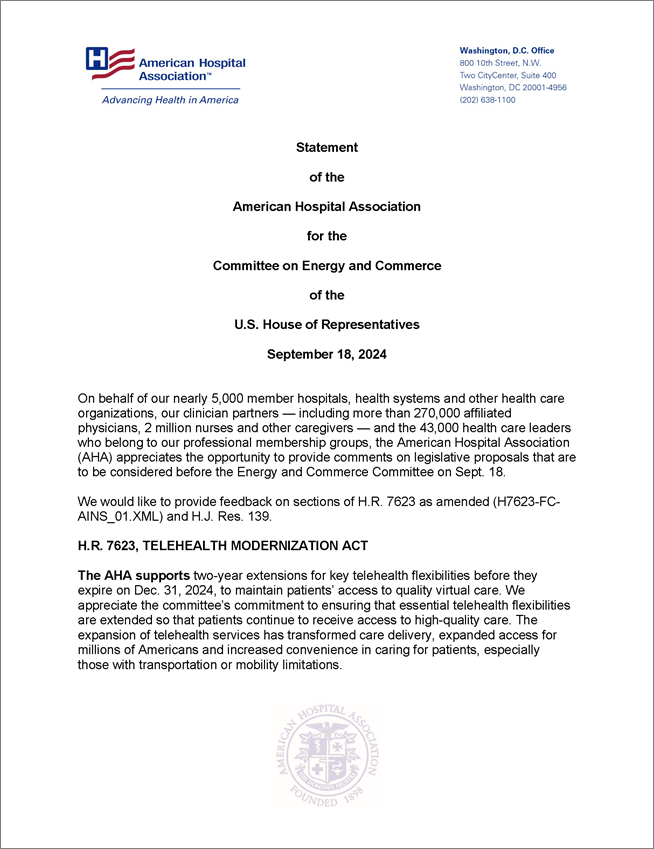AHA Statement on Legislative Proposals to be Considered Before Energy and Commerce Committee On Sept. 18
Statement
of the
American Hospital Association
for the
Committee on Energy and Commerce
of the
U.S. House of Representatives
September 18, 2024
On behalf of our nearly 5,000 member hospitals, health systems and other health care organizations, our clinician partners — including more than 270,000 affiliated
physicians, 2 million nurses and other caregivers — and the 43,000 health care leaders who belong to our professional membership groups, the American Hospital Association (AHA) appreciates the opportunity to provide comments on legislative proposals that are to be considered before the Energy and Commerce Committee on Sept. 18.
We would like to provide feedback on sections of H.R. 7623 as amended (H7623-FC-AINS_01.XML) and H.J. Res. 139.
H.R. 7623, TELEHEALTH MODERNIZATION ACT
The AHA supports two-year extensions for key telehealth flexibilities before they expire on Dec. 31, 2024, to maintain patients’ access to quality virtual care. We appreciate the committee’s commitment to ensuring that essential telehealth flexibilities are extended so that patients continue to receive access to high-quality care. The expansion of telehealth services has transformed care delivery, expanded access for millions of Americans and increased convenience in caring for patients, especially those with transportation or mobility limitations.
In addition, the AHA supports Section 104 which would require dissemination of best practices to support individuals with limited English proficiency in accessing telehealth services, and Section 105, which would enable patients to receive in-home telehealth care for cardiac rehabilitation services administered from hospitals or hospital outpatient departments.
AHA supports Section 102 to extend the hospital-at-home waiver for five years, through the end of 2029. Over the past few years, hospitals and health systems have expressed the need for long-term stability within the H@H program. Standing up a H@H program requires logistical and technical work, with an investment of time, staff and money. In addition to being approved for the federal waiver, some providers must navigate additional regulatory requirements at the state level. For some, this whole process could take a year or more to complete before the first patient can be seen at home.
However, the AHA opposes Section 404 which would require a separate identification number and an attestation for each off-campus outpatient department of a provider.
The AHA urges the committee to strike this section which would require that each off-campus hospital outpatient department (HOPD) be assigned a separate unique health identifier. Hospitals and other providers bill according to federal regulations, which require them to bill all payers — Medicare, Medicaid and private payers — using codes that indicate the location of where a service is provided. As a result, this provision would impose an unnecessary and onerous administrative burden on providers and needlessly increase Medicare program administrative costs.
This section also would require that as a condition of payment, hospitals submit an attestation of compliance with the Medicare provider-based regulations for each of their off-campus HOPDs within two years of enactment. Given hospitals’ experience with review and approval of similar attestations in the past, we are concerned that this requirement would be extremely burdensome for hospitals and Medicare contractors and therefore urge the committee to reject this provision.
H.J.Res.139, PROVIDING FOR CONGRESSIONAL DISAPPROVAL UNDER CHAPTER 8 OF TITLE 5, UNITED STATES CODE, OF THE RULE SUBMITTED BY THE CENTERS FOR MEDICARE & MEDICAID SERVICES RELATING TO "MEDICARE AND MEDICAID PROGRAMS: MINIMUM STAFFING STANDARDS FOR LONG-TERM CARE FACILITIES AND MEDICAID INSTITUTIONAL PAYMENT TRANSPARENCY REPORTING”
The AHA supports H.J.Res.139 for Congress to disapprove of this rule and prohibit the Secretary of Health and Human Services from implementing or enforcing this rule. The AHA and its members are committed to safe staffing to ensure high-quality, equitable and patient-centered care in all health care settings, including long-term care (LTC) facilities. Yet, the process of safely staffing any health care facility is about much more than achieving an arbitrary number set by regulation. The Centers for Medicare & Medicaid Services’ (CMS) one-size-fits-all minimum staffing rule for LTC facilities creates more problems than it solves and could jeopardize access to all types of care across the continuum, especially in rural and underserved communities that may not have the workforce levels to support these requirements.
We believe this final rule could exacerbate the already serious shortages of nurses and skilled health care workers across the care continuum. The agency estimates that 79% of LTC facilities would have to increase staffing to meet the proposed standards, including the new standard requiring 24/7 RN staffing. Considering the massive structural shortages described by recent studies, it is unclear from where this supply of nurses will come, and it is inconceivable that LTC facilities will be able to meet these standards without detrimental effects on workforce availability throughout the care continuum. Strengthening the health care workforce requires investment and innovation, not inflexible mandates.
CONCLUSION
Thank you for your consideration of the AHA’s comments on these legislative proposals. We look forward to continuing to work with you to address these important topics on behalf of our patients and communities.


